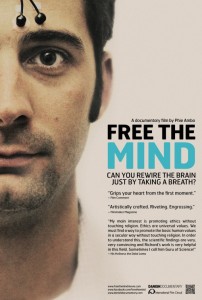
Release Date: May 17, 2013 (Limited)
Director: Phie Ambo
MPAA Rating: Not Rated
Film Pulse Score: 7.5/10
The human brain is such a complex mechanism that to this day we still don’t know the extent of its full potential. Billions of nerve endings carry signals through our brain that could trigger an autonomic response, induce an emotion or even store a memory. Quite simply, albeit far from it, the brain is like a computer. It has its basic operating system but the rest needs to be programmed. What happens when this programming is interrupted by say a traumatic experience? How does the brain react? What part or parts of it are affected? Is there a way to reprogram the brain? Phie Ambo’s fascinating documentary looks at how one professor attempts to use meditation and breathing to help treat Post Traumatic Stress Disorder (P.T.S.D.)
Professor Richard Davidson, recognized by Time magazine in 2006 as one of the 100 most influential people of the year, met the Dalai Lama in 1992. At that meeting, the Dalai Lama suggested that Davidson, a renowned neuroscientist, shift his focus from the study of anxiety and depression to that of compassion and kindness. Adapting various philosophies and yoga techniques, Davidson developed a study that would attempt to measure the effect of breathing and meditation on an individual coping with P.T.S.D.. The documentary focuses on three individuals. A veteran who is in the midst of a divorce, a veteran who is growing distant from his family and a little boy with special needs.
Breathing and meditation seems like such a new age yoga practice that it is often dismissed by many as non-therapeutic. It even seems a bit childish especially when viewed from the eyes of a child. However as the documentary shows it can be quite calming and centering. The way it is applied here is fascinating and eye opening. While the results are not immediate the benefits are quite compelling. Wisely, Ambo doesn’t bombard the viewer with scientific jargon that may cause someone to tune out. Fairly basic yet informative animation is used to simplify and convey what is occurring within the brain. She even goes so far as to use a lecture to children to teach a lesson. Throughout you have a general understanding at what’s going on, how the treatment is applied and how the results are reached.
The subjects of the documentary are compelling none more so than little 5 year old Will who had a traumatic experience in an elevator. You want to hold him when you see the abject fear take hold of him when he has to think about riding in one again. The other two subjects, Steve and Rich, give a sliver of an idea of what thousands of other veterans are dealing with on a daily basis. All three are shown techniques that in the short term prove effective but the long term results are still in question. It is a study that is still in its infancy but is clearly heading in the right direction to providing alternative treatment for a disorder that affects so many.
Post Traumatic Stress Disorder affects thousands and surprisingly studies such as this are not administered around the world. The benefits are undeniable even if it may only be a short term resolution. The research continues and the data is constantly compiled and hopefully some sort of treatment program can become of this. If you or someone you know may benefit from this research go to www.projectwelcomhometroops.org for more information.






